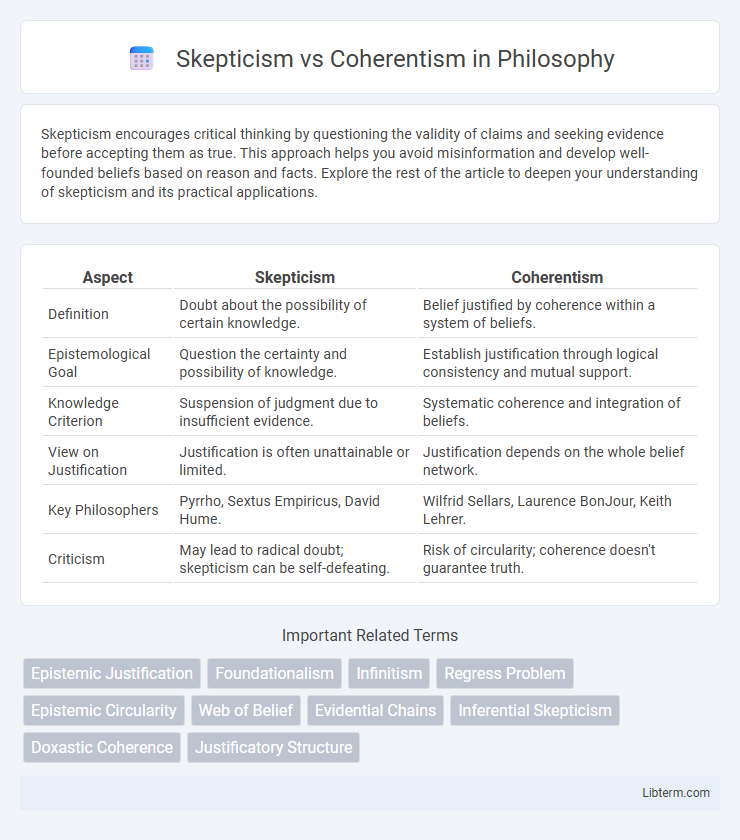Skepticism encourages critical thinking by questioning the validity of claims and seeking evidence before accepting them as true. This approach helps you avoid misinformation and develop well-founded beliefs based on reason and facts. Explore the rest of the article to deepen your understanding of skepticism and its practical applications.
Table of Comparison
| Aspect | Skepticism | Coherentism |
|---|---|---|
| Definition | Doubt about the possibility of certain knowledge. | Belief justified by coherence within a system of beliefs. |
| Epistemological Goal | Question the certainty and possibility of knowledge. | Establish justification through logical consistency and mutual support. |
| Knowledge Criterion | Suspension of judgment due to insufficient evidence. | Systematic coherence and integration of beliefs. |
| View on Justification | Justification is often unattainable or limited. | Justification depends on the whole belief network. |
| Key Philosophers | Pyrrho, Sextus Empiricus, David Hume. | Wilfrid Sellars, Laurence BonJour, Keith Lehrer. |
| Criticism | May lead to radical doubt; skepticism can be self-defeating. | Risk of circularity; coherence doesn't guarantee truth. |
Introduction to Skepticism and Coherentism
Skepticism questions the possibility of certain knowledge by challenging the reliability of sensory experiences and the foundations of belief, emphasizing doubt and critical examination. Coherentism, in contrast, asserts that beliefs are justified through their coherence within an interconnected system, where mutual support among beliefs replaces foundational certainties. Both theories address epistemic justification but diverge on the nature of belief validation, with skepticism highlighting uncertainty and coherentism emphasizing systemic consistency.
Defining Skepticism: Core Concepts
Skepticism centers on questioning the possibility of certain or justified knowledge, emphasizing doubts about the reliability of beliefs and sensory experiences. It challenges the foundational assumptions underlying knowledge claims and highlights the problem of infinite regress in justification. This critical stance contrasts with coherentism, which holds that beliefs gain justification through their coherence within a broader system, rather than requiring indubitable foundations.
Core Principles of Coherentism
Coherentism centers on the principle that beliefs are justified when they form a consistent and mutually supportive system, rather than relying on foundational beliefs. Knowledge is viewed as a web of interconnected beliefs, where justification stems from the overall coherence among these beliefs. This approach opposes skepticism by rejecting the need for indubitable foundations, emphasizing instead the systematic integration and mutual support within a belief network.
Historical Background of Both Philosophies
Skepticism traces its roots to ancient Greek philosophers such as Pyrrho and Sextus Empiricus, who emphasized doubt and questioned the possibility of certain knowledge. Coherentism emerged during the 19th and 20th centuries, influenced by thinkers like Hegel and Brand Blanshard, positing that beliefs are justified by their coherence within a system rather than foundational certainties. The historical contrast highlights skepticism's challenge to knowledge claims and coherentism's response through a holistic framework of justification.
Key Arguments for Skepticism
Skepticism challenges the possibility of attaining certain knowledge by highlighting the problem of infinite regress in justification, where every belief requires support from another belief ad infinitum. It argues that sensory experiences and rational deductions are vulnerable to errors and illusions, undermining the reliability of empirical and rational sources. Key skeptical arguments include the argument from ignorance, which emphasizes the lack of definitive proof for most claims, and the argument from underdetermination, illustrating that evidence can support multiple, conflicting theories.
Key Arguments for Coherentism
Coherentism argues that beliefs are justified through their coherence within an interconnected web of beliefs, emphasizing mutual support rather than isolated foundations. This approach counters skepticism by asserting that no single belief stands alone, but is validated by its consistency and integration with other beliefs. The key argument for coherentism is that knowledge is best understood as a system where justification arises from the harmonious fit of beliefs rather than foundational certainty.
Major Criticisms of Skepticism
Skepticism faces major criticisms for its self-defeating nature, as it questions the possibility of knowledge while relying on the very concept it disputes. Critics argue that radical skepticism leads to epistemic paralysis, rendering meaningful inquiry and rational discourse impossible. Coherentism challenges skepticism by emphasizing the interconnectedness of beliefs, allowing for justification within a holistic framework rather than demanding infallible foundations.
Major Criticisms of Coherentism
Major criticisms of coherentism center on its potential to endorse isolated belief systems disconnected from external reality, as coherence alone may not guarantee truth or empirical accuracy. Critics argue that coherentism allows for multiple, equally coherent but contradictory belief sets, undermining objective justification. This epistemological challenge questions coherentism's ability to satisfactorily address skepticism compared to foundationalist approaches relying on self-evident or indubitable beliefs.
Modern Perspectives: Integrations and Debates
Modern perspectives on skepticism versus coherentism explore the integration of coherentist epistemology with contemporary challenges posed by radical skepticism, emphasizing how coherentist frameworks address issues of justification through the mutual support of beliefs within a system. Recent debates highlight the tension between skepticism's demand for indubitable foundations and coherentism's reliance on systemic coherence, fostering new models that incorporate probabilistic reasoning and contextual factors. Philosophers like Ernest Sosa and Laurence BonJour contribute to evolving coherentist theories that reconcile skepticism by refining criteria for epistemic justification and acknowledging cognitive limitations.
Conclusion: Evaluating Skepticism vs Coherentism
Evaluating skepticism versus coherentism reveals that skepticism questions the possibility of certain knowledge, emphasizing doubt and uncertainty, while coherentism supports knowledge justification through the mutual support of beliefs within a consistent system. Skepticism challenges the foundations of knowledge claims, whereas coherentism offers a practical approach by validating beliefs based on systemic coherence rather than absolute certainty. The conclusion favors coherentism for its ability to provide a robust framework for knowledge without requiring indubitable foundations, addressing skepticism's core concerns.
Skepticism Infographic

 libterm.com
libterm.com